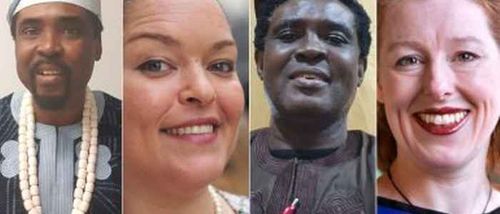Decolonising Afropean entanglements in material culture, embodied heritage, and extractive industry

The structure of The Black Dialogues 2.0 is inspired on traditional African forms of engagement like palace gatherings and village assemblies. It consists of a two-day symposium, the first taking place on October 13th at Utrecht University (you can find the program for day 1 here). On the 21st of October, we will explore contemporary global issues relevant to Africa and the African diaspora today. As conversations about decolonisation grow in universities, cultural spaces, corporations, and politics, we invite you to critically reflect on the historical entanglements between Africa and Europe. These complex ties, formed through long histories of migration and globalisation, have shaped unequal experiences of place, movement, and belonging across borders, with lasting effects on people’s lives.
This programme will bring together conversations on three connected themes: the impact of European colonialism on African material cultures, African and Afro-diasporic cultural expressions, and Afropean experiences of identity and belonging. Through dialogue, we will address issues such as cultural erasure, assimilation, industrial consumerism, and cultural sustainability. Our goal is to reflect on the complexities and intertwined histories of these relationships together. We will focus particularly on the legacies of natural resources, material cultures, and embodied heritage.
Participants will critically examine colonial and postcolonial histories and address socio-economic and ecological inequalities. Through this dialogue, we’d like to offer suggestions and strategies to enhance equilibrium in Afropean partnerships across academic, cultural, and corporate sectors in society.
Please note: during this event, photos and videos will be taken which will be used for documentation and publication purposes. If you have any objections to this, please notify the photographer.
Programme
- Panel 1 & contributions from the audience
- African and Afro-Diasporic music performance
- Pause
- Exhibition
- African and Afro-Diasporic music performance
- Panel 2 & contributions from the audience
- Closing remarks
The panel discussions cover thematic discussions on decolonising African/Black material cultures, embodied heritage, and extractive industries legacies, and exploring how they shape and are shaped by the ongoing complex and intertwined transnational entanglements between Africa and Europe.
Panel 1
- Olupemi Oludare (Panel chair): Assistant Professor of Black History, University of Amsterdam; African and Afro-diasporic cultural practitioner and performing artist
- Rachel Gillett: Assistant Professor of Cultural History & European Colonialism, Utrecht University; Expertise in Black Atlantic from a French perspective
- Carlo Hoops: Cultural heritage scholar; master drummer, performing artist, and instructor
- Ayaovi Kokousse: Master drummer, dancer, and instructor, Forêt Sacrée Obouibé
- Amara Diabate: Master drummer, kora player, and instructor, Djembe-Amara
Dialogue questions:
- What is Black cultural production and what role do various forms of media play in relation to arts, culture, resources, and social change?
- How do material cultures and embodied heritage, as well as their roots and re/circulations serve as primary sources of African/Black histories, and how can they inform understandings of identity, belonging, resistance, and empowerment contexts emerging from the ongoing Afropean entanglements?
Panel 2
- Madeline Young (Panel chair): Researcher/Lecturer at Exeter Centre for Research on Africa & Camborne School of Mines, University of Exeter; Afro-diasporic cultural practitioner
- Edward Oludare: Educator, Dowen College Lagos; African cultural practitioner and artist
- Ebere Nnenne Ibekaku: Acting Head of Mission, Federal Republic of Nigeria Embassy in the Netherlands
- M M L Singapi: Acting Head of Mission, South African Embassy in the Netherlands
- William Charles Manful: Deputy Head of Mission, Republic of Ghana Embassy in the Netherlands
Dialogue questions:
- How have colonial and postcolonial dynamics influenced the sociocultural materialities associated with mining and material cultures in Africa and Europe?
- How can we advocate for sustainability and equitable development in African resources and material cultures that engages a reflective approach to the Afropean entangled history, cultural legacy, and calls for the restitution and decolonization of museums, archives, and cultural practices?